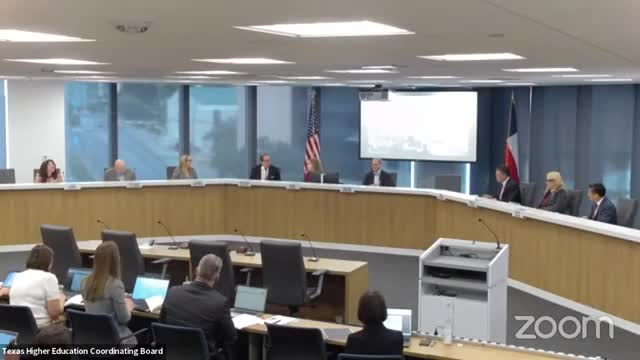THECB highlights workforce models: MD Anderson STARS and San Jacinto biomanufacturing honored
Get AI-powered insights, summaries, and transcripts
Subscribe
Summary
At its Oct. 23 quarterly meeting the Texas Higher Education Coordinating Board recognized institutions receiving 2025 STAR Awards and heard detailed presentations on two workforce programs: the MD Anderson STARS allied‑health apprenticeship and San Jacinto College's biomanufacturing training center.
The Texas Higher Education Coordinating Board on Oct. 23 recognized this year’s STAR Award recipients and heard detailed presentations on two workforce programs the agency said are building “a Talent Strong Texas.” Assistant Commissioner Brandon Griggs introduced the awards and framed them as examples of institutional innovation that align higher education with employer needs.
Why it matters: The presentations offered concrete program designs that board members and staff said can be models for other colleges. Both programs combine curriculum redesign, employer partnerships and work‑based learning to shorten student pathways into in‑demand jobs.
MD Anderson: paid clinical apprenticeships and rapid hiring
Kim Hoggett Crumwiddie, dean of the School of Health Professions at the University of Texas MD Anderson Cancer Center (who introduced herself as “Dr. K”), described the Student Talent Advancing Retention Success program, or STARS, which embeds students into paid, up to 20‑hour per week clinical roles while providing tuition coverage, mentorship and leadership development. The program began in 2022 with 10 students and now enrolls more than 30 annually.
Crumwiddie reported outcomes the school presented to the board: 100% credential completion and hiring rates for STARS participants; in fiscal year 2024 the program generated about $4.5 million in patient revenue; the school reported a return‑on‑investment figure of roughly 650% and said recruitment time for hires reduced from about 120 days to roughly 25 days.
Crumwiddie said the program recruits students from community colleges and four‑year institutions, supports stacked credentials and offers tuition reimbursement for students working in the clinical roles. “We develop this program because as the students are coming in, we want them to work at MD Anderson,” Crumwiddie told the board. She said MD Anderson also seeks to expand “satellite” clinical training to retain more graduates locally and to create multi‑credential “super techs.”
Board members asked about transferability and employer recognition; Crumwiddie said MD Anderson’s reputation and the program’s students’ credentialing scores support broad employer acceptance, adding that the institution is discussing articulation and satellite training with other Texas providers.
San Jacinto College: building a biomanufacturing pipeline
Christopher Wilde, assistant vice chancellor and vice president of biotechnology at San Jacinto College, described the college’s Center for Biotechnology at Generation Park. Wilde said the center launched Texas’ first community college biomanufacturing training program, backed by a $10 million state appropriation and partnerships with the National Institute for Bioprocessing Research and Training (NIBRT).
Wilde said industry partners — including Lonza, Fujifilm, Thermo Fisher and others — helped shape curriculum, donated more than $3.5 million in equipment and established internships. Since the 2024 launch, Wilde said students have secured jobs before graduation, the program delivered over 1,000 corporate training hours and the college has positioned itself to serve incumbent workers and K‑12 pipelines. He also described the program’s role in a recent major site selection: San Jacinto College reported it had been workforce lead in a process announced last month in which Eli Lilly selected a Generation Park site for a multi‑billion‑dollar manufacturing campus.
Wilde described two program pillars: credit, stackable credentials that offer multiple exit points including a two‑year associate degree, and corporate/custom training that builds skills for incumbent workers. “Now we’re the exclusive provider in the Southeast U.S. for the NIBRT curriculum for bioprocessing and biomanufacturing training at the technical level,” Wilde said.
Board context and next steps
Assistant Commissioner Griggs framed the presentations as advancing the agency’s Talent Strong Texas strategic goals — increasing credential attainment, aligning programs with employer demand and improving affordability and completion. He noted the coordinating board received 32 nominations for STAR Awards this year and that future board meetings will include presentations from additional award winners.
Both presenters said their programs are sharing materials and that the coordinating board plans webinars and forums to let institutions disseminate lessons learned.
Ending: The board thanked presenters and scheduled additional STAR Award recipient presentations at future meetings and at the Higher Edge leadership conference in December.
